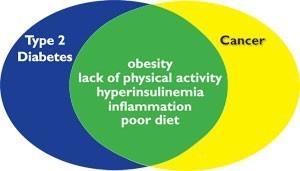Nearly 30 million people in the United States have type 2 diabetes. Being overweight or obese increases the chances of developing diabetes. Both obesity and diabetes are linked to cancer.
Findings from a new study published in the journal Science Translational Medicine suggest that sulforaphane, a phytochemical that has shown strong cancer-preventive actions in lab and clinical studies, might also reduce some of the harmful effects of type 2 diabetes in obese adults.
“Sulforaphane is useful not only for cancer prevention but it also demonstrates anti-diabetes and many other activities,” says Jed Fahey, ScD, Director of the Cullman Chemoprotection Center at the Johns Hopkins School of Medicine and one of the authors on the study.
Sulforaphane comes from broccoli and other cruciferous vegetables such as kale, cabbage, and radishes. It contributes to the vegetables’ slightly pungent aroma and flavor.
The liver of a healthy person naturally produces glucose, a type of sugar, and releases it into the blood. But the liver of a person with poorly controlled type 2 diabetes produces as much as three times the normal amount of glucose.
A team of scientists from Sweden, Switzerland, and the U.S. set out to learn what effects sulforaphane has on liver glucose production and blood sugar control in people with type 2 diabetes. They chose sulforaphane out of more than 3,800 drugs and natural products because the pattern of genes that sulforaphane switches on or off overlapped with the genes related to diabetes.
First, the scientists performed a series of experiments in cells and animals that demonstrated sulforaphane reduces liver glucose production and improves symptoms of diabetes.
Then they conducted a study involving 97 adults with type 2 diabetes. About a third of these people had poorly controlled diabetes and of these, 17 were obese.
After undergoing tests to check their blood sugar, the participants were randomly given either a powdered placebo or broccoli sprout extract every day for 12 weeks. Neither the participants nor the researchers knew which they were taking. Each daily dose of the extract contained roughly the same amount of sulforaphane as in 1 to 2 ounces of high quality broccoli sprouts. (The amount of sulforaphane from cruciferous vegetables varies based on many things, including the plant type, its age, and growing conditions.)
Broccoli sprouts contain more sulforaphane than any other cruciferous vegetable, according to Fahey.
After 12 weeks, the participants who were heaviest and had poorly controlled diabetes saw the greatest benefits from broccoli sprout extract. This group had lower blood sugar levels compared to the group who received the placebo. Participants who took the broccoli sprout extract and whose diabetes was well controlled experienced no changes in their blood sugar levels.
After 12 weeks, the participants who were heaviest and had poorly controlled diabetes saw the greatest benefits from broccoli sprout extract.
The researchers also measured the amount of sulforaphane in the participants’ blood and noted that the levels varied from person to person. “People vary in their ability to utilize sulforaphane,” says Fahey. “The amount found in a person’s blood would differ based on their biological characteristics.” The higher the blood concentration, however, the greater the change in the participants’ fasting blood sugar.
Although few of the participants experienced any negative effects after taking the broccoli sprout extracts, the researchers cautioned against people taking the supplement. More testing is needed to understand how sulforaphane works and who would benefit most from it.
For lower risk of both diabetes and cancer overall, research points to whole foods, which provide a variety of nutrients and other compounds that act synergistically.
For lower risk of both diabetes and cancer overall, research points to whole foods, which provide a variety of nutrients and other compounds that act synergistically. You can read more about sulforaphane and other beneficial compounds found in broccoli and cruciferous vegetables in AICR’s Foods that Fight Cancer.
Funding for the study was provided by the Ragnar Söderberg Foundation, the Swedish Foundation for Strategic Research, Lantmännen Research Foundation, the NovoNordisk Foundation, ALF Region Skåne, the Hjelt Foundation, the Lewis B. and Dorothy Cullman Foundation, and Knut and Alice Wallenberg’s Foundation via the Wallenberg Centre for Molecular and Translational Medicine in Gothenburg.
Thanks to Teresa Johnson for guest blogging.
Teresa L. Johnson, MSPH, MA, RD, is a nutrition and health communications consultant with a long-time interest in the role of plant-based diets and cancer prevention. Her work draws on elements of nutritional biochemistry, phytochemistry, toxicology, and epidemiology.






